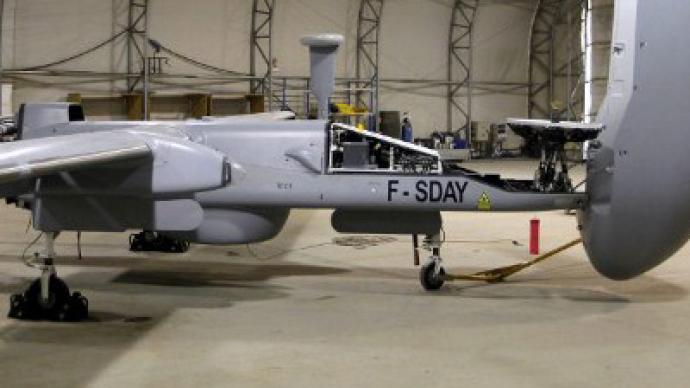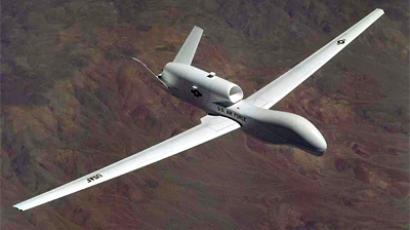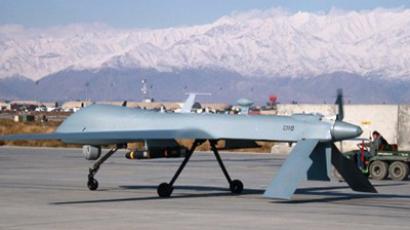Feds hide data on domestic use of drones

The domestic use of stealth drones to survey America from the skies is no joke. The Department of Homeland Security has acknowledged that the US government has used the planes on the home front for years, but why and how is largely unknown.
An advocacy group aims to change that.The Electronic Frontier Foundation, a non-profit based out of San Francisco, California, filed a Freedom of Information Act request back in April to learn more about domestic drone use in America. Eight months later, the Department of Transportation (and its subdivision that deals directly with domestic drones, the Federal Aviation Administration), has failed to follow through. On Tuesday this week, the EFF responded by formally filing a suit against the DoT, “Demanding data on certifications and authorizations the agency has issued for the operation of unmanned aircraft, also known as drones.”Aside from what is leaked out of the Pentagon to the media, much isn’t clear about drone use except for a seemingly endless series of misadventures that have plagued the Department of Defense in recent months. As the US military continues drone operations overseas, the craft fleets have been linked to the firing of missiles, the monitoring of both insurgents and civilians and escalating tensions between the US and Iran. In terms of military use, drone operations have yielded widespread opposition from the likes of constitutional rights advocates, presidential candidate Ron Paul and the American Civil Liberties Union. Regardless, the government is only adding an arsenal of more and more craft to its fleet every month, adding international bases and investing billions in new unmanned planes.American drone missions overseas are being launched for obvious reasons, despite how the government describes it. Domestic use, however, is largely kept in the shadows and is rarely discussed. San Francisco’s EFF says that at least 285 missions have occurred in America, but they want to know more about them. The US government, however, is being far from accommodation in regards to their request.With the filing of the suit on Tuesday, the EFF hopes that they will be able to finally let the public understand why spy planes are being flown through American skies without the people of the country given any reason or warning as to why.“There is currently no information available to the public on which specific public and civil entities have applied for, been granted or been denied certificates or authorizations to fly unmanned aircraft in the United States,” the EFF’s complaint says. In April they filed their FOIA request for information, and with no response nearly a year later, they have determined that by September of 2011, almost 300 missions by 85 separate users were certified by the FAA in all. The FAA, a component of the DOT, approves all domestic drone missions. A recent report revealed that the they are currently in the works to approve non-federal use of the spy craft planes in the US, drafting a legislation that will umbrella any local law enforcement unit to deploy drones as they would a street cruiser or bike cop."This is a tool that many law enforcement agencies never imagined they could have,” Steven Gitlin of AeroVironment Inc. told the Los Angeles Times in November. His company is already in the works to supply law enforcement agencies with 18,000 of small drone crafts once the FAA grants them clearance. In the meantime, however, the federal government continues to operate these missions without explaining why. Such a shadowy-nature has only increased paranoia for Americans skeptic of the Big Brother branding near synonymous with the Obama administration, and an ongoing assault on the civil liberties of citizens is driving those previously unaware of drones to disavow the use. “The use of drones in American airspace could dramatically increase the physical tracking of citizens – tracking that can reveal deeply personal details about our private lives,” EFF Staff Attorney Jennifer Lynch says in a statement. “Drones give the government and other unmanned aircraft operators a powerful new surveillance tool to gather extensive and intrusive data on Americans’ movements and activities,” she adds, noting that the usage rises “significant privacy concerns.”“We’re asking the DOT to follow the law and respond to our FOIA request so we can learn more about who is flying the drones and why,” Lynch pleads in explaining the suit. While America waits for the truth, they are left with only one option: to prefer for the worst and cover their tracks."Most Americans still see drone aircraft in the realm of science fiction," author Peter W. Singer added to the Times. "But the technology is here. And it isn't going away. It will increasingly play a role in our lives. The real question is: How do we deal with it?"














